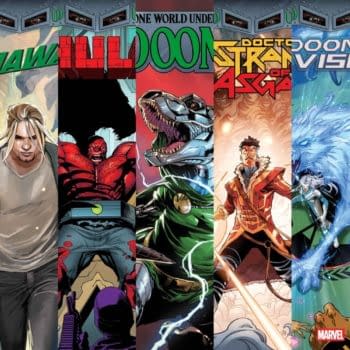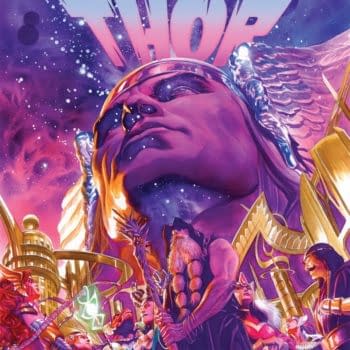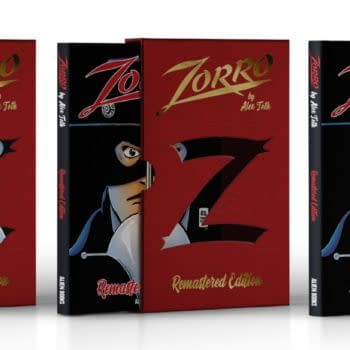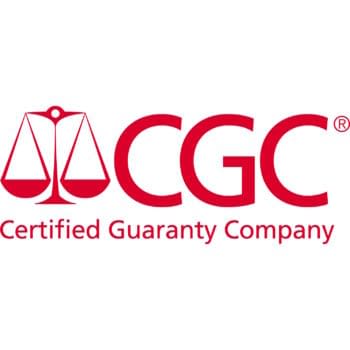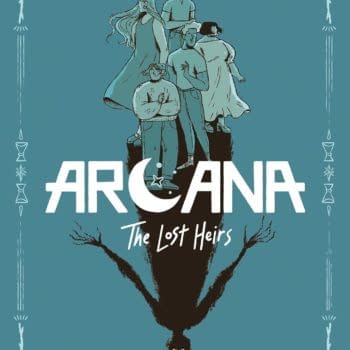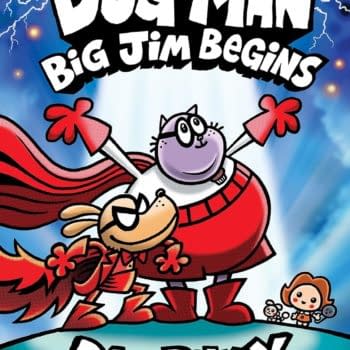Posted in: Comics | Tagged: African, black panther, Comics, Fans, marvel
What Marvel's Black Panther Comic Means To A Bunch Of African Fans
By Abdulkareem Baba Aminu
I read tons of superhero comics as a kid, mostly alongside Ibrahim Yakubu, my super-talented friend who should be up on the pantheon of global superstar artists but isn't (story for another day). Aged about 9 or 10, we would with other kids, an informal group of geeks, voraciously read comicbooks ranging from our staples (Marvel and DC), to European fare like Tintin, Asterix and 2000 AD, Beano, Whizzer & Chips, Buster, Topper and loads more British publications. I would even raid my sister Adama's stash of British girlie comics (no shame there, the stories in Bunty, Tammy and Mandy were cool and the art fantastic!) Many of us geeks "outgrew" comics, but a good number of us didn't, even evolving into writers and artists, while discovering French masterpieces by Moebius, Jodorowsky, Jerome Charyn, Francois Boucq, Enki Bilal, and ahem, Manara to mention a few.
As a kid, it was awesome beyond words that a character like the Black Panther even existed, and many of my friends and I would create characters in the same mould as Marvel's number one African superhero. I consumed every single appearance of his I could lay my hands on, mostly guest appearances or some issues during his Avengers days. I remember some Mighty World of Marvel appearances, too. Heck, I recall buying a Fantastic Four colouring book simply because there was a page, a black and white reproduction of a Jack Kirby masterpiece showing T'Challa, the Richards clan and friends duking it out with a villain I don't remember now. I didn't care where I found it, if it had the Black Panther, I would get it.
For those who don't know (and I'm guessing they exist), the Black Panther is the first black superhero in mainstream American comics and was created by Stan Lee and Jack Kirby, first appearing in Fantastic Four #52 in July 1966. There was something about the character that spoke to me, and my being African. It made me feel proud, because he was noble. It made me feel confident, because he was powerful. And, also, it made me feel a sense of responsibility because, I mean, here's a king with all the power you could imagine, but getting down and dirty being a superhero, fighting bad guys to save the world. To save me, and of course you. If a powerful monarch could be so selfless, what about a mere mortal like myself?
Then came the little disappointments over the years from my childhood days. There were no T-shirts with the Black Panther on them, or TV shows or lunchboxes. Certainly no toys. I was heartbroken, but felt a little better when I discovered Storm of the X-Men, who I thought at the time looked like my big sister, minus the platinum hair, white eyes and dramatic English, of course. For a while there was nothing out there for me, Black Panther-wise and I went on with my wide-ranging interests including Batman, Daredevil, X-Men, Teen Titans, Swamp Thing, and many others.
But along came the Marvel Knights line, along with it Christopher Priest's brilliant take on the Black Panther. I hungrily read each and every issue of the run. The most evil villains, the most compelling supporting cast and the most awesome art characterised the series, but the single most unforgettable aspect of it all is reading for the first time that T'Challa and his bodyguards, the all-female Dora Milaje, spoke between themselves a language called Hausa. I was bowled over! Hausa is one of the three major languages of Nigeria, the language I spoke as a child and still do, the playground lingua franca in Kaduna where I grew up. I loved the character even more, if it were possible. And I still do.
Years passed, and the Reginald Hudlin incarnation, particularly 'Who is The Black Panther?' dropped, leaving me breathless once again, in part due to the art, by one of my all-time favourites, John Romita Jr. But even that honeymoon reached an end, followed by some pretty good presence on the racks, mostly in event series like Secret Invasion and so on. He was also brilliant in the Illuminati series, even if he declined membership initially. His roles in Jonathan Hickman's Avengers run, or in the recently-concluded Secret Wars series are outstanding, showing a character at his well-written best.
A little over a decade ago, when I was a wet-behind-the-ears reporter, Hollywood star Wesley Snipes visited Nigeria and I was invited to a party in his honour in Abuja. I asked him about the rumour about him playing T'Challa in a Black Panther movie and he said: "The Black Panther means a lot of things, but what my friend over there is talking about is a presently-unannounced project based on a '60s Marvel comicbook of the same name. I've always been attracted to the story because the protagonist is a strong African figure, a monarch who is very intelligent and powerful, who uses his gifts to protect his people from external forces." Snipes continued: "And as for me doing research here in Nigeria, no: That's not what I'm here for. But now that you've mentioned it, it sounds like a great idea. I'd absolutely love to do 'Black Panther' in Nigeria." But that never happened, and while I was heartbroken, I moved on.
Fast-forward a bit to now, a little after the Black Panther kicked major butt on the Captain America: Civil War movie trailer, and to the sizzling preview pages released via an article in The Atlantic, written by newly-anointed Marvel writer Ta-Nehisi Coates. The buzz in Africa, especially here in Nigeria, was palpable even as my Facebook page was positively electrified. The story, via a few pages-long preview, promised to be action-packed and full of intrigue, while the art by Brian Stelfreeze, beautiful as ever, reassured. Add to this the impending movie starring Chadwick Boseman and directed by Ryan Coogler, and I couldn't be more ecstatic than I am right now. A future with a brand new Black Panther series and movie is always an exciting place to look forward to being.
A good number of my friends are major comicbook fans and some of them – all fine professionals in their various chosen fields of endeavour – share what the character means to them. Below, are their views:
Lulufa Vongtau: I cannot remember exactly when I first encountered the Black Panther, from decades ago. But I do remember feeling elated and excited, and the sense of belonging it brought me. Over the years since then, I have kept watch over him as he evolved into an icon, through the disappointment of failed series and movies, to the excitement of his pre-eminence in the current Marvel universe. I feel T'Challa is a beacon of hope, not just to Africa, but the whole world.
Ibrahim Yakubu: Thinking of the first time I saw those striped gloves, the eerie mask and his mien (every penciller seemed to maintain it awesomely), I don't exactly recall what issue of 'The Defenders' it was, but I can still remember all the panels he appeared in. Today the Black Panther, like Daredevil, is a sight to behold. His appearance in the upcoming Captain America: Civil War movie and his new comic series has me anxious as heck! What more can a fan who's waited since childhood ask for?
Mohamed Marwa: I came across the Black Panther when I was about 8 or 9 years old, and in truth I was terribly fascinated by him. First of all, he was one of the few black heroes back then. Basically, one had a choice of T'Challa or the black dude from the Super Friends cartoon. Naturally, the richness of the Black Panther's character spoke to me. He was a king, smart, obviously as tough as they come and best of all, he was African. In the 80's, stereotypes of what's African included either a starving Ethiopian or some sort of Tarzan-like bush-man trope, so it was very heartening to have the Black Panther to look up to. Back then, I also thought he got his name from the Black Panther Party for Self Defence, which obviously increased his stature in my eyes. In 1980s Cambridge Massachusetts, a little overprotected kid couldn't look farther than the comics at drugstores, which only carried the majors, which T'Challa wasn't then. Funny enough, subsequently, my problem wasn't that I wanted more black heroes. It was that I wanted more of the Black Panther.
Sewedo Nupowaku: Looking back now, I was never mightily impressed by the Black Panther character as a child. The socio-political significance of the comicbook chronicling T'Challa and the world of Wakanda was lost on me. I thought it was a limp, token gesture from Marvel creators to readers' like myself. Sure, I enjoyed some of the works of Christopher Priest and Ken Lashley, but the Black Panther was way off my top ten favourite books. Then came the Reginald Hudlin-penned, Marvel/BET-produced Black Panther animated mini, and everything changed. The writing was at once socio-politically relevant yet bristling with enough pyrotechnics to keep the fanboy in me excited, featured an all-star cast of heavy-hitting voice talent such as Djimon Hounsou, Jill Scott and Kerry Washington and a supremely infectious theme song. It was like I had never been to Wakanda before! That series changed my estimation of the character and made me fall in love with his world. It remains a potent brew of socio-political commentary on race, economics and technology as well as a visionary take on African futurism. Hopefully, the newly-launched book will pack a wallop and deepen my appreciation.
Abolaji Alausa: As a kid, the first thing I did was search for Wakanda on the African map. Imagine my disappointment when I realized the most affluent black nation was as fictitious as Genosha. I had to keep my plans to relocate on hold. Captain America was the earliest character I learned how to draw, so I am connected to him at some level, but that doesn't stop me from rooting for Black Panther every single time they had to face-off. Black Panther was my first real connection to this world we've all grown to love. So imagine my joy when I heard Ta-Nehisi Coates was penning the new series! And with Chadwick playing T'Challa, Marvel has finally paid me back for 35 years of loyalty. Now I can finally relocate to Wakanda, middle of Civil War or not.
Abdulkareem Baba Aminu is a newspaper editor, award-winning journalist and comic book creator based in Nigeria. He has reviewed comics, novels, movies and music for a variety of platforms and is currently the Editor of the Saturday edition of the Daily Trust, one of the most influential newspapers in his country. You can follow him on Twitter: @KareemReal















